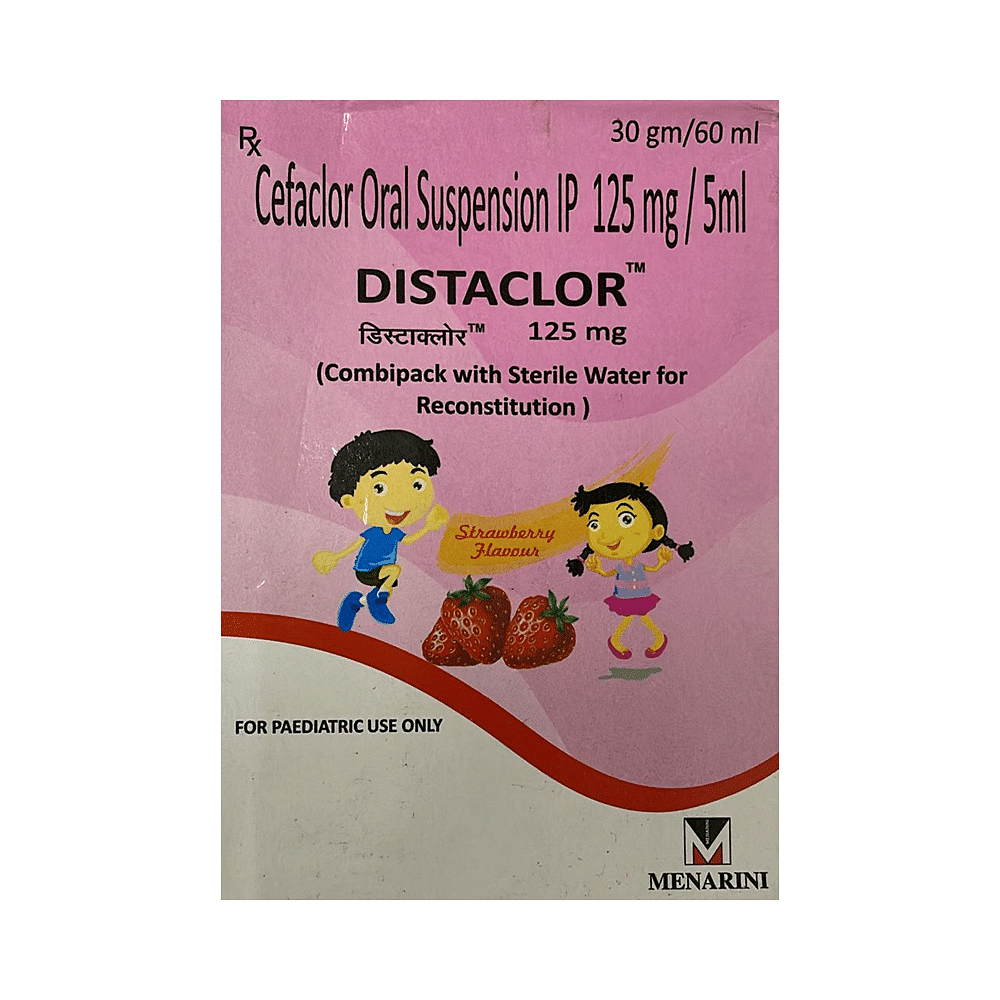
Cecel 125mg Suspension
Manufacturer
Zee Laboratories
Salt Composition
Cefaclor (125mg)
Key Information
Short Description
Cecel 125mg Suspension is a medicine that helps treat a wide range of bacterial infections in children.
Dosage Form
Suspension
Introduction
Cecel 125mg Suspension is a medicine that helps treat a wide range of bacterial infections in children. These may include infections of the ear, eyes, nose, throat, lungs, skin, and urinary tract. It works by stopping the multiplication of infection-causing bacteria thereby preventing the infection from spreading.
Directions for Use
Give this medicine with food to avoid an upset stomach. Give your child plenty of water if they develop diarrhea as a side effect.
Safety Information
Side Effects
No common side effects listed
Interacting Medicines
Magaldrate Sodium Bicarbonate
How it works
Cecel 125mg Suspension is an antibiotic. It works by preventing the formation of the bacterial protective covering (cell wall) which is essential for the survival of the bacteria. By doing so, this medicine stops the infection-causing bacteria from growing further and prevents the infection from spreading without causing resistance against further treatment.
Quick Tips
Cecel 125mg Suspension is not recommended for children less than 1 month of age. Ensure that your child completes the entire course of antibiotics. Quitting in between may cause the bacteria to multiply again or cause another infection. Give this medicine with food to avoid an upset stomach. Give your child plenty of water if they develop diarrhea as a side effect. Conditions like common cold and flu are caused by viruses. Never use this medicine for such conditions. Avoid saving up the medicine for future use and focus on giving Cecel 125mg Suspension to your child for their current infection. Stop this medicine and immediately report to your child’s doctor in case your child develops an itchy rash, facial swelling, or breathing difficulties while taking this medicine.
Related Medicines

Distaclor 125mg Oral Suspension

Kefcil 125mg Suspension

Zenclor 125mg Suspension

Actaclor 125mg Suspension

Halocef 125mg Suspension

Vercef 125mg Suspension

Alclor Suspension
Frequently asked questions
What are the potential risks of exceeding the recommended dosage of Cecel 125mg Suspension in a child?
Exceeding the recommended dose of Cecel 125mg Suspension may increase the risk of adverse effects, including an increased incidence of side effects like vomiting, diarrhea and gastrointestinal disturbances. It's important to strictly adhere to the prescribed dosage for your child. Always consult with a healthcare professional if you have any concerns or experience unusual symptoms while using this medication.
Are there potential serious side effects associated with Cecel 125mg Suspension that warrant immediate medical attention?
While Cecel 125mg Suspension is generally well-tolerated, in some cases it may cause rare but serious adverse effects. This includes persistent vomiting, kidney damage, allergic reactions, severe diarrhea and a heightened risk of developing serious gastrointestinal infections. In the event of such side effects, seek immediate medical attention.
Can Cecel 125mg Suspension be taken in conjunction with other medications?
It's important to consult your child's doctor before administering Cecel 125mg Suspension alongside other medications or substances. There is a potential for interactions between these medications, which could have adverse effects on your child’s health. It's crucial to communicate with the doctor about all medication and supplements that your child may be taking before beginning treatment with Cecel 125mg Suspension.
Can vaccination occur while my child is taking Cecel 125mg Suspension?
Generally, antibiotics do not interfere with the ingredients in vaccines or cause a negative reaction in children who have recently received vaccinations. However, it's best to consult your child’s doctor before administering any medicine after a vaccination, unless there are specific instructions from them.
What kind of lab tests might be needed for long-term use of Cecel 125mg Suspension?
The frequency and type of laboratory tests vary based on your child’s age, their overall health condition, and the specific reason for administering Cecel 125mg Suspension. The doctor will determine if lab tests like renal function and liver function tests are needed during long-term use of this medication.
How might Cecel 125mg Suspension impact my child's digestive system?
The administration of Cecel 125mg Suspension may disrupt the child’s digestive system as it contains ingredients that can kill both harmful and beneficial bacteria. This disruption is often a consequence of killing both the bad bacteria and the good bacteria in the gut, which leads to an upset stomach. To reduce this risk, administer Cecel 125mg Suspension with meals to help regulate your child’s digestive system.
What should I do if my child experiences diarrhea while on Cecel 125mg Suspension?
If your child develops diarrhea while taking Cecel 125mg Suspension, it's crucial to remain vigilant and continue the prescribed course of medication. Instead, reach out to your child’s doctor for guidance on managing the situation. They may advise adjusting the dosage based on your child’s condition.


